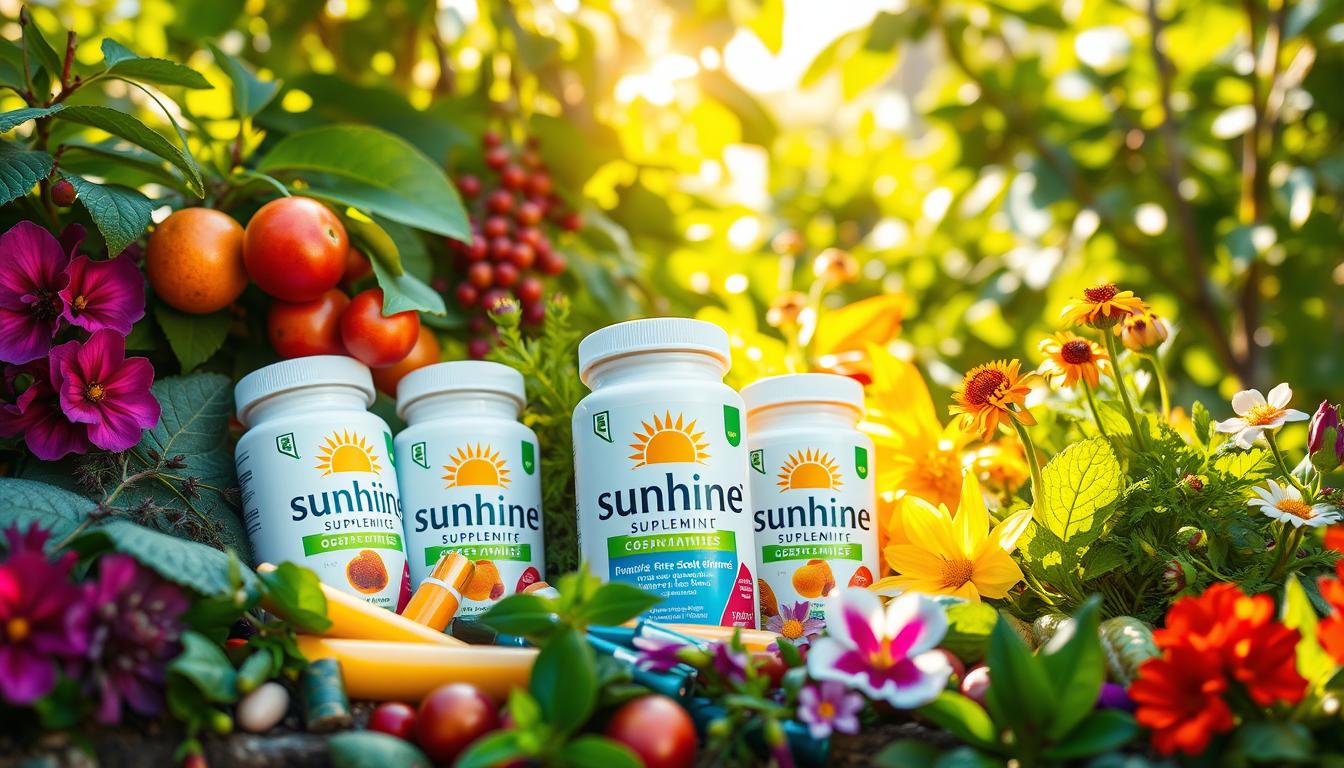Did you know over 60 adults shared their thoughts on different multivitamins? They talked about taste, texture, and convenience. Also, 19 multivitamins were tested for size, smell, and texture. These results show how important it is to pick the right organic vitamins for your health.
Organic vitamins can be great for your daily routine. They’re helpful when it’s hard to get all the nutrients you need from food. If you have a special diet, health issues, or certain medical conditions, good natural supplements can help. They give you the plant-based nutrients your body needs.
Key Takeaways
- Organic vitamins can be beneficial for those with dietary restrictions or medical conditions
- Multivitamins are designed to meet the increased nutritional needs of specific life stages
- Quality organic vitamins are independently tested and contain research-backed ingredients
- Organic vitamins use the most absorbable forms of vitamins and minerals
- Natural supplements can help fill nutritional gaps when it’s difficult to meet vitamin and mineral needs through food alone
Understanding Organic Vitamins
Organic vitamins come from whole foods, without synthetic additives. They offer better absorption and fewer side effects. Plus, they include extra nutrients from whole foods.
What Are Organic Vitamins?
Organic vitamins use plant-based sources like fruits and veggies. They don’t have pesticides or GMOs. This keeps the natural nutrients and compounds that help them work better.
Benefits of Choosing Organic
- Improved nutrient absorption and utilization by the body
- Fewer side effects and better tolerated by sensitive individuals
- Presence of additional beneficial compounds found in whole foods
- Support for overall health and well-being
Difference Between Organic and Non-Organic Vitamins
The main difference is in their source and how they’re made. Synthetic, non-organic vitamins are made in labs with isolated compounds. Whole-food, organic vitamins come from plants, keeping the natural nutrient balance.
| Organic Vitamins | Non-Organic Vitamins |
|---|---|
| Derived from whole-food sources | Produced using synthetic, isolated compounds |
| Free from pesticides, GMOs, and artificial ingredients | May contain binders, fillers, and other additives |
| Contain natural co-factors, enzymes, and phytonutrients | Lack the synergistic effects of whole-food nutrients |
| Typically more expensive than non-organic options | Generally more affordable than organic supplements |
“The body cannot distinguish between nutrients derived from a lab or a plant. What matters most is the availability and absorption of those nutrients.”
The Importance of Daily Vitamins
Adding organic, herbal vitamins and eco-friendly, botanical supplements to your daily routine is key for health. These natural options help fill nutritional gaps, boost energy, and strengthen your immune system.
Supporting Overall Health
Studies show that a good multivitamin can lower the risk of vitamin and mineral deficiencies. This is true for those with limited diets or digestive problems. Multivitamins ensure you get all the nutrients your body needs, which is vital if your diet lacks some vitamins and minerals.
Boosting Energy Levels
B-complex vitamins in herbal and eco-friendly supplements are vital for turning food into energy. They help your body produce energy naturally, fighting off fatigue and giving you a daily energy boost.
Strengthening Immunity
- Vitamin C is a strong antioxidant that boosts the immune system and aids in skin health and wound healing.
- Zinc is key for a healthy immune system and can lessen cold severity and duration.
- Vitamin D, known as the “sunshine vitamin,” regulates immune responses and may lower infection risks.
By adding a variety of organic, herbal vitamins and eco-friendly, botanical supplements to your daily routine, you support your health, energy, and immune function.

Key Nutrients Found in Organic Vitamins
Organic vitamins are key for your health. They contain plant-based nutrients, known as “green vitamins.” These are full of vitamins, minerals, and antioxidants that help your body work right.
Essential Vitamins for Daily Health
Organic vitamins have important vitamins like vitamin D, B12, and folate. Vitamin D helps with bones, immune, and muscle health. Vitamin B12 is key for making red blood cells, energy, and brain function.
Folate is important for cell growth and preventing birth defects in pregnant women.
Role of Minerals in Wellness
Organic vitamins also have minerals like iron, calcium, and magnesium. Iron helps make hemoglobin, which carries oxygen. Calcium is for strong bones and teeth. Magnesium helps muscles, nerves, and energy.
Importance of Antioxidants
Antioxidants like vitamins C and E are in organic vitamins too. They fight off free radicals, which can harm your health. Vitamin C boosts your immune system. Vitamin E keeps cells safe and skin healthy.
Adding organic vitamins to your daily routine is good for your body. They give you the nutrients you need to stay healthy. These natural supplements are great for your overall health and well-being.
Popular Types of Organic Vitamins
Organic vitamins are a natural way to support your health. They come in many forms, from multivitamins to specific nutrient supplements. Each type has its own benefits.
Multivitamins
Organic multivitamins give you all the vitamins and minerals you need every day. Brands like Thorne and Life Extension make high-quality ones. They use nutrients that your body can easily absorb.
Vitamin D
Vitamin D is key for strong bones and health. If you don’t get enough sun, taking an organic vitamin D supplement can help. It’s great for those who don’t get enough sunlight.
Vitamin C
Organic vitamin C supplements boost your immune system. They help keep your body healthy and strong.
B-Complex Vitamins
B-complex vitamins are important for energy, brain function, and handling stress. Organic whole-food vitamins with all B vitamins are good for those needing extra support.
| Organic Vitamin | Key Benefits | Top Brands |
|---|---|---|
| Multivitamin | Comprehensive nutritional support | Thorne, Life Extension |
| Vitamin D | Bone health, immune function | Garden of Life, New Chapter |
| Vitamin C | Immune system support | Nature Made, MegaFood |
| B-Complex | Energy metabolism, stress management | Thorne, Naturelo |
Adding these organic vitamins to your daily routine can boost your health. They use whole-food nutrients to support your well-being.

How to Choose the Right Organic Vitamins
Choosing the right organic vitamins is key. Look for certifications like USP or NSF. These ensure the supplements are pure and potent. Also, think about your diet, age, and health.
Reading Labels and Certifications
Check the labels on organic vitamin supplements carefully. Stay away from products with fillers, binders, and additives. Choose non-synthetic vitamins for better body absorption.
Considering Your Dietary Needs
- If you’re vegetarian or vegan, pick eco-friendly vitamins that fit your diet.
- Pregnant women and those with health issues need specific natural supplements.
- Find multivitamins that match your age, gender, and lifestyle.
Consulting a Healthcare Professional
For the best results, talk to a healthcare expert. A registered dietitian or your doctor can guide you. They’ll help pick the right non-synthetic vitamins and dosage for you.
“Choosing the right organic vitamins can make a significant difference in your overall health and well-being.”
By reading labels, understanding your needs, and getting professional advice, you can find the best eco-friendly vitamins. They will support your journey to optimal health and wellness.
Benefits of Natural Ingredients in Vitamins
The ingredients in your vitamins and supplements are key to your health. Choosing botanical supplements and plant-based nutrients offers many benefits. These go beyond just basic nutrition.
Sourcing from Whole Foods
Vitamins and supplements from whole food sources have more benefits. For example, berberine in plants can lower blood sugar and improve heart health. Curcumin from turmeric is better than some drugs for arthritis symptoms.
Avoiding Synthetic Additives
Many vitamins have synthetic additives, fillers, and preservatives. These can harm you or block nutrient absorption. Green vitamins from natural, organic sources avoid these issues. They help you stay healthy and well.
Enhanced Absorption and Efficacy
Natural compounds in botanical supplements improve how your body uses vitamins and minerals. Garlic supplements, for instance, are better at lowering blood pressure than some drugs. This shows how nature’s nutrients can meet your body’s needs well.
“Organic farming uses no synthetic fertilizers or pesticides, no antibiotics or growth hormones for livestock, and no genetically modified ingredients, artificial flavors, colors, or preservatives.”
Adding plant-based nutrients to your daily routine can unlock natural health support. It’s a holistic way to care for your overall well-being.

Top Brands for Organic Vitamins
Several top brands are known for their quality and commitment to natural ingredients. They offer everything from whole-food supplements to fermented vitamins. These companies focus on using natural, high-quality ingredients to help you stay healthy.
Garden of Life
Garden of Life is famous for its organic vitamins and supplements. They use raw, non-GMO, and certified organic ingredients. This ensures you get the most nutrients from their products. They have a wide range of supplements, including multivitamins, probiotics, and more.
New Chapter
New Chapter is known for its fermented vitamins and minerals. This method makes nutrients easier to absorb. They offer organic, non-GMO supplements for various health needs, from daily multivitamins to herbal remedies.
Nature Made
Nature Made is a trusted name for affordable, organic vitamins. Their supplements are made with natural ingredients and tested for purity and potency. They have a big selection of single vitamins, minerals, and multivitamin formulas.
MegaFood
MegaFood is a leader in organic vitamins and supplements. Their products use whole foods, like fresh fruits and vegetables, for a full range of nutrients. They focus on transparency, third-party testing, and sustainable practices.
These top brands offer quality, tested, and innovative organic vitamins. Whether you need whole-food supplements, fermented vitamins, or something affordable, they have what you need. They help support your overall health and well-being.
How Organic Vitamins Promote Digestive Health
Keeping your digestive system healthy is key to feeling good. Organic vitamins can help a lot. They often have prebiotics and probiotics to feed good bacteria in your gut. This helps keep your gut balanced, which is important for digestion and immune health.
Organic vitamins also have fiber from whole foods to help with digestion. Fiber keeps your bowels regular and prevents constipation. Some even have herbs like ginger and turmeric to ease digestive issues.
The Importance of Vitamin D for Digestive Health
Vitamin D is vital for absorbing calcium, which is good for bones and teeth. It’s also important for people with inflammatory bowel diseases. Vitamin D helps control inflammation.
Few foods naturally have vitamin D, but fatty fish like salmon are good sources. Fortified foods like milk and cereals are also options. Supplements are handy for keeping vitamin D levels up, which is important for those who don’t get enough sun.
Fiber and Digestive Soothing
Organic vitamins also have fiber to help with digestion. Fiber keeps your bowels regular and prevents constipation. It also lowers the risk of problems like hemorrhoids.
Some vitamins also have herbs like ginger and peppermint to soothe your stomach. These can help with symptoms of IBS, acid reflux, and stomach upset.
Adding organic vitamins to your daily routine can boost your digestive health. Always talk to a doctor before starting any new supplements.

Lifestyle Changes to Enhance Vitamin Absorption
Keeping a healthy lifestyle is key to getting the most from your eco-friendly vitamins and plant-based nutrients. A few easy changes in your daily life can help your body better absorb these important nutrients.
Healthy Eating Habits
Eating a balanced diet is the first step to better vitamin absorption. Eat lots of plant-based foods like fruits, veggies, whole grains, and legumes. They are full of eco-friendly vitamins and green vitamins.
Also, take your vitamins with healthy fats. Avocados, nuts, and olive oil are great for this. They help your body absorb fat-soluble plant-based nutrients better.
Regular Exercise
- Exercise is good for your health and helps your body use nutrients better.
- It boosts blood flow, which helps move eco-friendly vitamins and green vitamins to where they’re needed.
- Exercise also helps make enzymes and hormones that help with nutrient absorption and use.
Staying Hydrated
Drinking enough water is key for your body to absorb and use eco-friendly vitamins, green vitamins, and plant-based nutrients. Drink water all day to help your body process these nutrients.
| Nutrient | Absorption-Boosting Tips |
|---|---|
| Vitamin A | Pair with healthy fats like avocado or olive oil |
| Iron | Consume with vitamin C-rich foods to enhance absorption |
| Magnesium | Stay hydrated and avoid excess calcium, which can inhibit absorption |
By making these simple changes, you can improve how your body absorbs and uses eco-friendly vitamins, green vitamins, and plant-based nutrients. This supports your health and well-being.
Potential Risks of Taking Organic Vitamins
Natural supplements, whole-food vitamins, and vegan vitamins are great for health. But, it’s key to know the risks. Always check the dosage and watch how your body reacts.
Overconsumption Concerns
One big worry is taking too much. Vitamins like A and D can build up and cause problems if you take too much. Always stick to the recommended amount and talk to a doctor before starting.
Allergies and Sensitivities
Some people might react badly to certain vitamins. Things like soy, gluten, and herbs can cause issues. Make sure to check the ingredients before taking anything new.
Interaction with Medications
Vitamins can also mess with your meds. They might make some drugs work better or worse, or cause side effects. Always talk to a doctor before adding new vitamins, if you’re on meds.
Knowing these risks helps you use natural supplements safely. With the right care, you can enjoy their benefits without worry.
Addressing Common Myths About Organic Vitamins
Organic vitamins and botanical supplements are getting more popular. It’s key to clear up some common myths about them. While non-synthetic vitamins and green vitamins can be good for health, they’re not a full diet replacement. They should be part of a balanced diet.
Myth: Organic Vitamins Are Always Better
Many think organic vitamins are always better than synthetic ones. But, a vitamin’s value depends on its bioavailability and the person’s needs. Sometimes, synthetic vitamins are better absorbed by the body.
Myth: You Can Substitute Food with Vitamins
Vitamins and botanical supplements should add to a healthy diet, not replace it. They can help with nutritional gaps but can’t match whole foods. Relying only on vitamins might miss out on important nutrients and fiber.
Myth: All Supplements Are Safe
Not all supplements are safe. The quality and purity of non-synthetic vitamins can vary a lot. It’s important to check for independent testing and certification. Some supplements can also interact with medicines or cause side effects, so always talk to a doctor before starting.
By debunking these myths, we help people make better choices about organic vitamins and green vitamins. A balanced and holistic health approach is the best way to enjoy their benefits.
Conclusion: Embracing Organic Vitamins for a Healthier Life
Organic vitamins bring many benefits to your health. They help your body absorb nutrients better and avoid harmful additives. Adding them to your daily routine can greatly improve your health.
Summary of Key Benefits
Organic vitamins are packed with vitamins, minerals, and antioxidants. They are grown in soil without synthetic fertilizers. This makes them better for you and the planet.
They also help the environment by using fewer pesticides. Plus, many are non-GMO and cruelty-free. This gives you peace of mind.
Steps to Incorporate Organic Vitamins
To use organic vitamins well, look for trusted brands. They should be transparent and tested independently. Think about what you need and talk to a doctor about the best supplements for you.
Start adding them to your daily routine. Do this along with eating well and staying active.
Encouraging a Holistic Approach to Wellness
Remember, organic vitamins are just part of a healthy life. They should not replace a balanced diet, exercise, and stress management. By combining these, you can fully benefit from organic vitamins.
This approach will help you live a healthier, more vibrant life.




